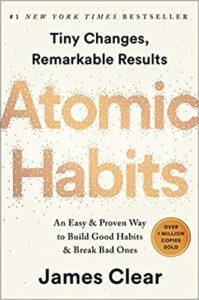 What Habit Do You Want To Break?
What Habit Do You Want To Break?
Before you read this, take a second and write down either a habit you’d like to form in your life, or a habit you’d like to break.
What would be different about you if you added/removed that one habit?
How would it change your identity?
“Atomic Habits” by James Clear* has been one of the most useful, most practical books I’ve ever read. Want proof? In the last 18 months I have:
- Moved my wake-up time one hour
- Moved my bed-time up one hour
- Taken up (and extended) a Bible-study / prayer habit
- Quit drinking alcohol during the week (sometimes you’ve just got to have a margarita on the weekends!)
- Quit social media (no Facebook or Instagram since May 2020)
- Started a daily devotional time with my wife (which has made a huge difference in our relationship!)
- And more
“Atomic” may bring to mind visions of massive, explosive, power, but Clear wants you to think of “atomic” in terms of the small particles (or actions) that combine with other small particles to form molecules. However, as those atomic actions/habits combine with other atomic habits, they do, indeed, release the energy needed to make massive shifts in your identity.
The Framework
Without giving too much away, James Clear provides a framework that can help you form a habit, or – by implementing the reverse – can help you break a bad habit. The basic structure is:
- Cue
- Craving
- Response
- Reward
For example, Law number 3, “Make It Easy” (Response) says that priming the environment makes taking action easier. By setting my phone’s blue light filter to automatically dim and set the phone to “do not disturb”, it also cues me to shut down my laptop for the night and dim the lights in the house, setting the environment for me to become tired and ready for bed.
The inverse, of Law #3 is “Make it Difficult”. In moving alcohol from my kitchen to a cabinet in a little-visited room, and removing cold beer from the fridge, it’s no longer easy to just reach in the fridge for a “cold one”. Just a few extra steps of friction, just a small change in my environment, makes it hard enough for me to skip the once habitual glass of wine or cold beer after getting home from work.
Who Are You?
Clear ties our habits to our identity, not our goals, which is different from many books in this vein. For instance, instead of saying “I want to lose ten pounds”, you should instead concentrate on the behaviors that make you the type of person who never misses a workout. Once the ten pounds are gone, then what? Do you go back to eating crappy food and sitting on the couch? (Research says that’s what most people do.) Goals are transient. Identity is permanent. If you want to be a healthy person, the kind of person who never misses a workout, then losing weight will happen if it needs to happen. After all, it’s more important to be healthy for the long haul.
Other Gems
Other juicy bits include his advice on finding a tribe. Forming a habit is easier when you are with like-minded people. In Clear’s words, you should “join a culture where the desired behavior is the normal behavior”. That’s pure gold.
Also habit-stacking. Habit stacking is where you implement a new behavior in the midst of habits you already have in place. For instance, if you want to start exercising more, how about doing push-ups (the new behavior) while your morning coffee is brewing (the existing habit)? The coffee becomes the cue for the habit you want to create.
And, again, the importance of creating the right environment. “The central idea is to create an environment where doing the right thing is as easy as possible…Reduce friction associated with our good habits and increase friction associated with our bad habits” (p. 155) This one piece of advice helped my wife and me identify a key reason why we were having trouble tracking our finances. Once we sat down together and identified what was making the activity difficult, and how we could make it easier, it completely changed the experience for us.
Conclusion
I’ve recommended “Atomic Habits” to many of my friends already. It has been a real game changer in my life. The small habits I’ve already been able to build have definitely compounded into better physical and relational health, more financial stability, and higher productivity in my own life. I can’t praise this book enough.
*Links to purchase products on this page are affiliate links.